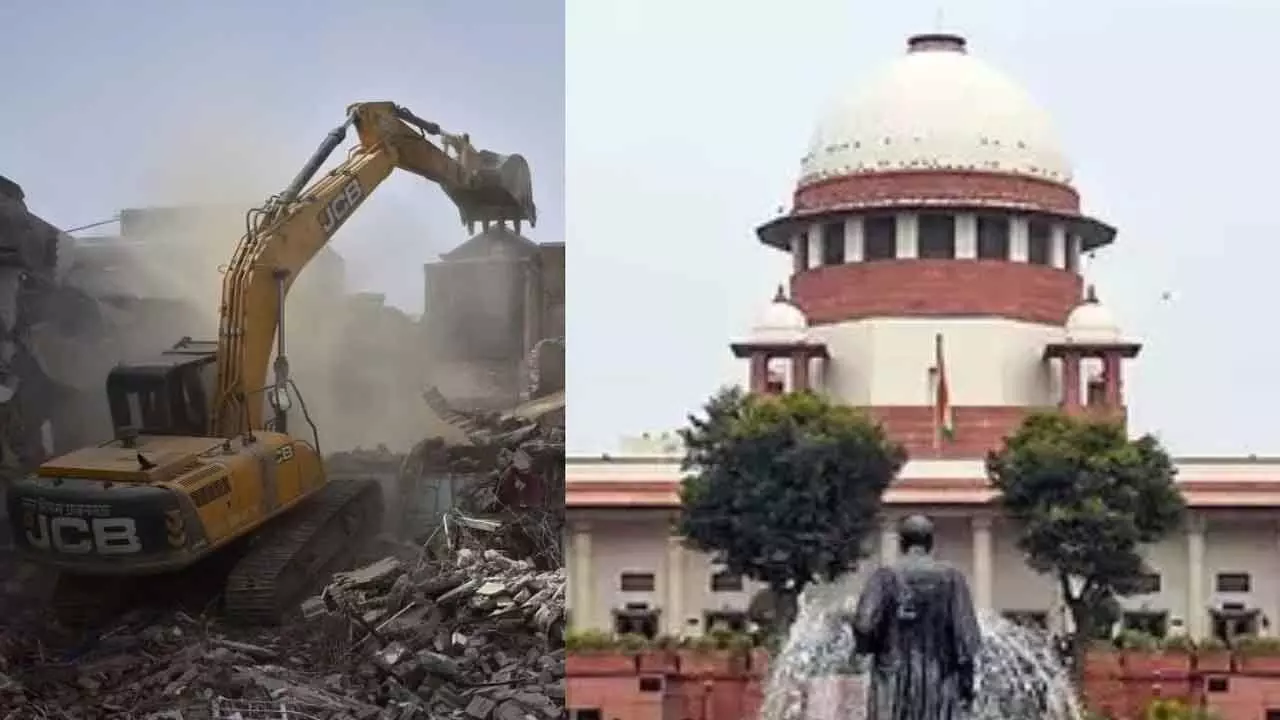Live
- Russia provided North Korea with anti-air missiles in exchange for troop deployment
- PCB appoints Azhar Ali as head of youth development
- Deepam-2 Scheme Reaches 5 Million Beneficiaries in Three Weeks, says Nadendla Manohar
- Will RG Kar tragedy impact Bengal bypoll results?
- BGT 2024:25: Josh Hazlewood picks four as Australia bundle out India for 150
- BRS rallies support for Lagacharla ‘victims’
- COP29: Scientists, artists, faith leaders call for greater commitment to delivery of climate finance
- Woman donates liver to husband, saves life
- Mechanic Rocky Review: Thrilling Action Film with Twists and Great Performances
- Ponguleti Sudhakar Reddy rubbishes Rahul Gandhi's claims on Modi and Adani
Just In

- No demolition even if person is convicted
- Apex court calls for pan-India guidelines
New Delhi: The Supreme Court on Monday observed that a house cannot be demolished even if the person has been convicted, while hearing a petition challenging bulldozer action against accused individuals in various cases. A bench comprising Justices BR Gavai and KV Viswanathan said it will put out pan-India guidelines to address concerns regarding the demolition of houses and buildings. "How can house be demolished just because he is accused? Can't be demolished even if he is convicted. Even after telling SC Bar is ... we don't find any change in attitude," justice Gavai remarked while hearing a plea filed by the Muslim scholars' body, Jamiat Ulama-e-Hind.
Senior Advocate Dushyant Dave, representing the petitioners, noted that several houses in Delhi were demolished immediately after the 2022 riots, alleging that their occupants had instigated the violence.
Senior Advocate Chander Uday Singh referred to a case in Udaipur where a person’s house was demolished because the tenant’s son was accused of a crime.
Justice Viswanathan, who mentioned that “nobody should take advantage of lacunas”, observed that a “father may have a recalcitrant son, but if house is demolished on this ground...this is not the way to go about it”.
Solicitor General Tushar Mehta, appearing for the Central government, argued that the houses are being demolished when there is a violation of the law. “We act only if there are municipal law violations,” he said.
In response, the bench noted, “But looking at the complaints, we feel there is a breach”. Justice Gavai said, “Though this is a position of law, it is being followed more in breach”, also observing that if construction is unauthorised, it has to be in “accordance with law”.
Justice Viswanathan also observed the need for a guideline on demolishing unauthorised buildings to be enforced across the state. Justice Gavai said, “Let the suggestions come. We will issue guidelines on a pan-India basis”.
“Immovable properties can be demolished only based on procedure...affidavit also filed by...we propose to lay down certain guidelines on a pan-India basis so that concerns with regard to issues raised are taken care of,” the bench said.
The Supreme Court will continue hearing the matter on September 17.
The top court is dealing with multiple cases related to the practice of using bulldozers to demolish properties allegedly linked to individuals involved in criminal activities. This, often termed “bulldozer justice,” has also been a subject of significant controversy.
Since the UP government started the practice of instant ‘justice’ using bulldozers to bring down properties of accused to make an example of them and put pressure on those absconding, other BJP-ruled states and even Congress ones, have followed suit. The authorities claim they only raze the illegal structures in a property, for which due notice is provided.
“Bulldozer justice” was brought into vogue by Uttar Pradesh Chief Minister Yogi Adityanath after he first assumed office in 2017 — earning him the moniker “bulldozer baba”. During his first term, Adityanath registered cases against around 15,000 people under the Uttar Pradesh Gangsters and Anti-Social Activities (Prevention) Act and demolished ‘illegally constructed’ houses of several accused. It was the BJP government’s way of putting distance between its regime and the alleged ‘lawless’ government of the Samajwadi Party in the state.

© 2024 Hyderabad Media House Limited/The Hans India. All rights reserved. Powered by hocalwire.com







